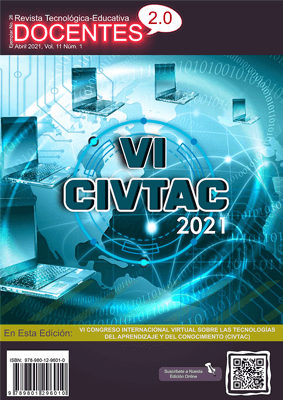Digital Ethnography of a Sick System: Higher Education and the Pandemic
 DOI:
https://doi.org/10.37843/rted.v11i1.189
DOI:
https://doi.org/10.37843/rted.v11i1.189
Main Article Content
Abstract
March 2020 marked us all, but it started shaking the schooled sector's immune system. However, to understand the strategies Academy applied to address the problem, one must understand the factors presented at the beginning of the pandemic. In this sense, the research that concerns it gives an account of digital ethnographic analysis. Part of a general presentation of the pre-pandemic digital educational context in Mexico and finally focuses on the autonomous university context. It aims to publicize the first actions implemented by different autonomous universities. It collects information derived from digital sources exposed on social networks such as video tips and university councils' reporting. Four autonomous universities are analyzed, and the information presented to official media is contrasted with data obtained through user surveys. The results present the constant and elements of three axes. The first points to the pre-pandemic social context immediately encompass academic decision-making for the community's organization and end with the actions taken on universities' virtual return. Finally, it invites the construction and incorporation of other knowledge that contribute to hybrid feature curriculums.
Downloads
Metrics
Article Details

This work is licensed under a Creative Commons Attribution-NonCommercial-NoDerivatives 4.0 International License.
Those authors who have publications in our journal accept the following terms:
- When a work is accepted for publication, the author retains rights of reproduction, distribution of his/her article for exploitation in all countries of the world in the format provided by our magazine and any other magnetic medium, optical, and digital.
- Authors will retain their copyright and guarantee the journal the right first to publish their work, which will be simultaneously subject to the Creative Commons Acknowledgment License (Attribution-NonCommercial-NoDerivatives 4.0 International (CC BY-NC-ND 4.0)). That allows third parties to copy and redistribute the material in any medium or format, under the following conditions: Acknowledgment - You must properly acknowledge authorship, provide a link to the license, and indicate if any changes have been made. You may do so in any reasonable way, but not in a way that suggests you have the licensor's endorsement or receive it for your use. NonCommercial - You may not use the material for a commercial purpose. NoDerivatives - If you remix, transform, or build from the material, you cannot broadcast the modified material. There are no additional restrictions - You cannot apply legal terms or technological measures that legally restrict you from doing what the license allows.
- Authors may adopt other non-exclusive license agreements to distribute the published version of the work (e.g., deposit it in an institutional archive or publish it in a monographic volume) provided that the initial publication in this journal is indicated.
- Authors are allowed and recommended to disseminate their work through the Internet (e.g., in institutional telematic archives, repositories, libraries, or their website), producing exciting exchanges and increasing the published work's citations.
- Request of withdrawal an article has to be done in writing by the author to the Editor, becoming effective after a written response from the Editor. For this purpose, the author or authors will send correspondence via e-mail: [email protected].
- The author will not receive financial compensation for the publication of his work.
- All Docentes 2.0 Journal publications are under the Open Journal System (OJS) platform at: https://ojs.docentes20.com/.
References
Bárcenas-Barajas, K., & Preza-Carreño, N. (2019). Desafíos de la etnografía digital en el trabajo de campo onlife. Virtualis. Revista de Cultura Digital, 134-151.
Hines, C. (2020). Online Ethnography https://assets-global.website-files.com/5989fc3322e8860001ac9a43/5b264973d227e578f81c39fa_tisdd_method_ch05_04_online_ethnography.pdf
Cáceres-Muñoz, J., Jiménez Hernández, A. S., & Martín-Sánchez, M. (2020). Cierre de Escuelas y Desigualdad Socioeducativa en Tiempos del Covid-19. Una Investigación Exploratoria en Clave Internacional. Revista Internacional De Educación Para La Justicia Social, 9(3), 199-221. https://doi.org/10.15366/riejs2020.9.3.011 DOI: https://doi.org/10.15366/riejs2020.9.3.011
Canclini, N. G. (2020). Ciudadanos reemplazados por algoritmos. https://play.google.com/books/reader?id=HJ_ODwAAQBAJ&hl=es&pg=GBS.PT10
Consejo Nacional de Evaluación de la Política de Desarrollo Social. (2019). La Política Social en el Contexto de la Pandemia por el virus Sars COV2 COVID-19 México. CONEVAL.
Portilla, D. (2020). Herramientas de una aplicación móvil de mensajería instantánea dirigida al fortalecimiento del proceso enseñanza – aprendizaje del inglés”, RTED, vol. 9, n. º 1, pp. 116-123, abr. 2020. DOI: https://doi.org/10.37843/rted.v9i1.109
INEGI. (2020). Sala de Prensa. https://www.inegi.org.mx/contenidos/saladeprensa/aproposito/2020/DOCSUP_Nal20.pdf
Instituto Nacional de Estadística y Geografía. https://www.inegi.org.mx/temas/educacion/default.html#Herramientas
Morozov, E. (2011). The Net Delusion: The Dark Side of Internet Freedom. Cambridge University Press.
Pink, S., Horst, H., Pastill, J., Hjorth, L., Lewis, T. & Tacchi, J. (2019). Etnografia Digital. Principios Y Practica. Morata.
Ramírez, J. S. (2020). Universidad Autónoma de Chapingo. https://www.chapingo.mx/comunicado-oficial-rec-099-2020/
SEP Secretaria de Educación Pública. (2019). Principales Cifras del Sistema Educativo Nacional 2018-2019. Secretaria de Educación Pública.
Sandoval, C. (2020). La Educación en Tiempo del Covid-19 Herramientas TIC: El Nuevo Rol Docente en el Fortalecimiento del Proceso Enseñanza Aprendizaje de las Prácticas Educativa Innovadoras. Revista Tecnológica-Educativa Docentes 2.0, 9(2), 24-31. https://doi.org/10.37843/rted.v9i2.138 DOI: https://doi.org/10.37843/rted.v9i2.138
Skageby, J. (2011). Handbook of Research on Methods and Techniques for studying Virtual Communities : Paradigms and Phenomena. En H. Ben Kei Daniel, Online Etnographic MethodsTowards a Quality Understanding of Virtual Community Practices Stockholm University.
Solís-Ramírez, J. (2020). Universidad Autónoma de Chapingo. https://www.chapingo.mx/comunicado-uach-stuach-26-marzo-2020/
UABC. (2020). Adelanta UABC inicio de clases en línea. [Status update]. Facebook. https://www.facebook.com/UABCInstitucional/posts/631951854317453
UABC. (2020). Gaceta UABC. http://gaceta.uabc.mx/notas/academia/se-suma-uabc-la-ampliacion-del-periodo-de-aislamiento-preventivo
UABC Institucional. (2020). Preguntas más frecuentes sobre la actualización del Plan de Continuidad Académica. [Status update]. Facebook. https://www.facebook.com/UABCInstitucional/posts/681528906026414
UAM. (2020). Proyecto Emergente de Enseñanza Remota virtual: https://www.uam.mx/educacionvirtual/uv/peer.html
UAM. (2020). UAM Virtual. https://www.uam.mx/educacionvirtual/uv/guias/consumo-datos-alumnos-v02-03.pdf
UAM Colegio Académico. (2020). Boletines UAM. http://www.uam.mx/ss/s2/comunicacionsocial/boletinesuam/236-20.html
UAM videos. (2017). Consejo Académico [Video]. YouTube. https://www.youtube.com/watch?v=0JLJavVNoPI
UASL. (2020). Universidad Autónoma de San Luis Potosí. http://www.uaslp.mx/Paginas/Noticias/2020/abril/Acuerdan-rectores-del-Consejo-Nacional-de-la-ANUiES-y-la-SEP-regreso-a-clase-el-1-de-junio.aspx
UASLP. (2020). Actas de Consejo Directivo Universitario. http://www.uaslp.mx/SecretariaGeneral/Documents/Actas%202020/5.ACTA_L_SO27MAYO.pdf
UASLP. (2020). Comunicado. Facebook. https://www.facebook.com/LaUASLP/photos/pcb.2768517223256104/2768516019922891/
UASLP. (2020). H. Consejo Directivo Universitario. http://www.uaslp.mx/SecretariaGeneral/Documents/Actas%202020/3.%20SO_20MARZO.pdf
Wegner, E., McDermott, R. & Snyder, W. (2002). Cultivando comunidades de Práctica. Guía para la administración del conocimiento. Harvard Business School.






